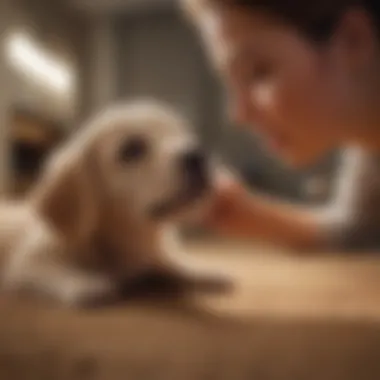Understanding Excitement-Induced Urination in Puppies


Intro
Excitement-induced urination in puppies is a behavior that can perplex many pet owners. Understanding this phenomenon is essential for effective handling and training. This behavior typically manifests when a puppy becomes overly excited or stimulated, often leading to unintended urination. Knowledge about the causes, behavioral implications, and management techniques is crucial for nurturing a well-adjusted canine companion.
Animal Profile
General Overview
Puppies are young domestic dogs, or Canis lupus familiaris, known for their playful nature and affectionate demeanor. They rely heavily on their caregivers from a young age, learning social norms and behaviors from their environment. The canine behavioral repertoire includes a variety of reactions to excitement; urination is just one of those responses. Understanding the underlying reasons for excitement-induced urination can assist in mitigating this behavior and improving the bond between the owner and the pet.
Habitat and Distribution
Puppies, as domesticated animals, share habitats with humans across various environments. They can be found in urban settings, rural areas, and suburban neighborhoods. The shared space between humans and dogs often creates unique interactions that can influence a puppy's development, including their reactions to stimuli. In environments where puppies are exposed to frequent social interactions, the likelihood of excitement-induced urination may increase.
Causes of Excitement-Induced Urination
Excitement-induced urination in puppies is primarily related to their physiological and psychological responses to stimuli. Here are some key points:
- Immature Bladder Control: Puppies do not have full control over their bladders until they are older. This lack of control can lead to accidents, especially during moments of high excitement.
- Emotional Responses: Overstimulation from things like visitors, new toys, or playful interactions can trigger this urination.
- Submissive Behavior: Some puppies may urinate when they feel submissive, using this behavior to show deference to those they perceive as higher status.
Behavioral Implications
Understanding the behavioral implications of excitement-induced urination is critical for pet owners. It can lead to feelings of embarrassment for the owner and fear or anxiety for the puppy, which could exacerbate the situation. Positive reinforcement training can be an effective way to encourage calm behavior in puppies, thereby reducing instances of excitement-induced urination.
Management Techniques
To manage this behavior, consider the following methods:
- Calm Environment: Creating a more controlled setting can help minimize overwhelming stimuli that provoke excitement.
- Regular Training: Encourage consistent bathroom breaks. Establish routines to help your puppy to associate certain actions with urination outdoors.
- Positive Reinforcement: Rewarding calm behaviors and successful outdoor urination can nurture desirable responses.
Preface to Excitement-Induced Urination
Excitement-induced urination in puppies can often be overlooked by pet owners, but its significance merits attention. A clear understanding of this phenomenon aids in addressing behavioral challenges, improving the bond between the puppy and its owner. This section will delineate the concept, its prevalence, and the implications for training and care. Recognizing that this is a natural response can lead to more effective strategies in managing it.
Definition and Overview
Excitement-induced urination is a response seen in young dogs when they experience heightened states of emotions, particularly excitement. This is not only a behavioral issue; it is deeply rooted in the physiological processes of puppies. Typically, this urination occurs when a puppy greets their owners or interacts with other dogs. The excitement might cause the puppy to lose control over their bladder, resulting in involuntary urination. Understanding this behavior is crucial for recognizing that it is not necessarily a sign of inadequate training or poor housebreaking.
Prevalence Among Puppies
Excitement-induced urination is more common among puppies, especially those under six months old. Studies indicate that around 20% of puppies may exhibit this behavior. The high prevalence is attributed to their developing neurological systems, which are not yet fully capable of regulating emotional responses. Additionally, smaller breeds tend to have higher occurrences compared to larger breeds. As they mature, many puppies outgrow this behavior, but some may continue to experience it due to temperament or environmental factors.
Understanding excitement-induced urination is vital not only to mitigate the problem but also to foster a healthy emotional development in the puppy.
Recognizing and addressing this behavior promptly can greatly assist in the housebreaking process and enhance the overall quality of life for both the puppy and the owner.
Physiological Mechanisms
Understanding the physiological mechanisms underlying excitement-induced urination in puppies is essential for pet owners and trainers alike. This encompasses the body’s natural responses to stimulation, and recognizing these can aid in effective management strategies. The knowledge of these mechanisms informs not only training methods but also fosters empathy towards the puppy's experiences. Addressing this topic sheds light on how interconnected physiological processes influence behavior, providing a well-rounded perspective on this common issue.
Neurological Responses
When a puppy experiences excitement, it triggers a series of neurological responses. The central nervous system plays a critical role in modulating these reactions. Specifically, the release of certain neurotransmitters sends signals throughout the body, resulting in various physical responses.
- Neurotransmitters such as dopamine and norepinephrine are released during moments of heightened arousal.
- This increased neural activity can sometimes affect control over bladder functions, leading to involuntary urination.


Many owners may observe their puppies wetting themselves in situations that involve joy or fear. These responses are typically not due to a lack of training, but rather a natural consequence of developmental and neurological factors. Understanding that these responses are neurological in origin helps owners approach the behavior without frustration.
It is important to recognize that excitement-induced urination is not a deliberate action but a physiological response to external stimuli.
Impact of Stress Hormones
The involvement of stress hormones cannot be overlooked when discussing excitement-induced urination. In moments of excitement, adrenaline and cortisol levels can spike. These hormones prepare the body for quick responses, influencing a puppy's ability to regulate bodily functions.
- Adrenaline can lead to a fight-or-flight response, promoting a rapid heart rate and increased physiological activity. In some cases, this can reduce the puppy’s awareness of its bodily signals, leading to urination.
- Cortisol, known as a stress hormone, can also impact bladder control. Elevated cortisol levels might affect the muscle control necessary for holding urine.
In essence, the impact of these hormones can result in a loss of voluntary bladder control. Recognizing this connection can encourage owners to remain calm and patient. Instead of viewing urination as a behavioral issue, it should be interpreted as a response to the emotional state of the puppy, influenced by stress and excitement.
Behavioral Context
Understanding the behavioral context of excitement-induced urination in puppies is essential for pet owners. This section addresses the developmental norms of puppies and their social interactions. Recognizing these aspects helps in effectively managing and mitigating inappropriate urination.
Normal Developmental Behavior
Puppies are in a critical stage of growth where they learn about their environment and social boundaries. Excitement-induced urination commonly arises during this period. As puppies explore new situations, their responses may be overwhelming, leading to the involuntary release of urine.
When puppies greet people or encounter new animals, their excitement can trigger this reflex. It is vital to acknowledge that this behavior is not a sign of poor training or bad manners but rather a normal part of their development. Young puppies often lack control over their bladder during high-energy moments, which is typical for their age.
Factors influencing normal developmental behavior include:
- Age: Very young puppies, especially those under six months, are more prone to this response.
- Environment: A chaotic or overly stimulating environment can heighten excitement levels.
- Personality: Individual temperaments affect how puppies react to stimulation.
Puppies generally outgrow this behavior as they mature and learn to manage their excitement better. However, understanding these developmental patterns is crucial as they guide owners in their training approach.
The Role of Social Interactions
Social interactions play a significant role in a puppy's response to excitement-induced urination. Puppies engage in various social scenarios, influencing their emotional states and behaviors.
When a puppy interacts with other dogs or humans, the excitement of these experiences can sometimes result in unintended urination. The positive feelings associated with socialization can overwhelm a puppy's capacity to control their bladder.
Consider the following aspects regarding social interactions:
- Exposure: Frequent, positive social interactions can help puppies learn to cope with excitement. Gradually increasing their exposure can teach better control.
- Learned Behaviors: Puppies observe their peers; if they witness other dogs reacting similarly, they may mimic those behaviors.
- Behavioral Reinforcement: Encouraging calm greetings when meeting people can help instill a sense of security, reducing excitement levels.
In summary, the behavioral context provides valuable insight into why puppies experience excitement-induced urination. Recognizing normal developmental behavior and the significance of social interactions equips owners with knowledge necessary for effective management.
Differentiating Between Excitement and Other Issues
Understanding the difference between excitement-induced urination and other potential causes is crucial for effective training and management of puppies. This distinction helps pet owners identify the right approach to mitigate the occurrence of urination due to excitement. Without recognizing the various underlying factors, owners may inadvertently misinterpret their puppy's behavior, leading to ineffective solutions or increased stress for both the dog and the owner.
Medical Conditions to Consider
Puppies can experience urination issues that are not solely related to excitement. Several medical conditions can cause or mimic excitement-induced urination. It is essential to be aware of these possibilities.
- Urinary Tract Infections: These infections can lead to frequent urination and may be confused with excitement-induced behavior. Symptoms include straining to urinate and blood in urine.
- Incontinence: Some puppies may have developmental or hereditary conditions affecting bladder control. This can lead to unexpected urination at any time, not just when excited.
- Diabetes: Increased urination can be a sign of diabetes, which may sometimes be diagnosed in young dogs. Monitoring for excessive drinking and changes in appetite can be helpful.
- Hormonal Imbalances: Certain hormonal disorders can influence bladder function.
It’s advisable for owners to consult a veterinarian if the urination seems excessive or out of character for the puppy. This proactive approach can rule out medical issues before assuming the behavior is solely due to excitement.
Behavioral vs.
Involuntary Responses
Another challenge in managing excitement-induced urination is distinguishing between behavioral responses and involuntary actions. Understanding this difference aids in training and allows for focused intervention.


- Behavioral Responses: These occur when a puppy responds to an emotional state. For instance, they might urinate with excitement when welcomed by their owner or when playing with other dogs. Recognizing this can help owners tailor their approach to reduce the triggers of excitement.
- Involuntary Responses: These occur without conscious control. In urine accidents linked to fear or anxiety, the puppy does not intend to urinate but does so due to stress. In these cases, addressing the underlying fear is critical for long-term management.
The ability to differentiate between behavioral and involuntary responses can profoundly impact training effectiveness and the emotional well-being of your puppy.
Recognizing these distinctions empowers owners to adopt appropriate training strategies, reinforcing positive behavior while addressing any potential underlying issues. Such a nuanced understanding enhances a puppy's training experience and fosters a healthier relationship with its owner.
Training and Management Strategies
Training and management strategies are essential for addressing excitement-induced urination in puppies. Understanding this behavior allows owners to approach the issue with informed techniques. By implementing effective strategies, pet owners can minimize occurrences of this response and create a more comfortable environment for their puppies.
Housebreaking Techniques
Housebreaking a puppy involves more than just getting them to relieve themselves outside. It is a foundational aspect of training that fosters a bond between the owner and the pet. Here are several techniques to consider:
- Consistency: Stick to a regular schedule for bathroom breaks. Take your puppy out after meals, play sessions, and naps.
- Designated Potty Area: Choose a specific spot outside for your puppy to eliminate. This helps them connect the area with bathroom habits.
- Supervision: Watch your puppy closely when they are indoors. Signs of excitement-induced urination often include circling or sniffing the ground.
- Positive Reinforcement: Reward your puppy with treats and praise immediately after they urinate in the appropriate area. This encourages them to repeat the behavior.
- Gradual Freedom: As your puppy becomes more reliable, give them more freedom within the house. This can help reduce their anxiety and help them feel secure.
Understanding these housebreaking techniques plays a crucial role in reducing excitement-induced urination.
Creating Calm Environments
Creating a calm environment is vital for minimizing excitement-induced urination. Puppies often exhibit this behavior during high-energy situations or overstimulation. Here are some strategies to consider:
- Controlled Introductions: When meeting new people or other dogs, manage the interaction to avoid overwhelming your puppy. This can include brief meetings to reduce sudden bursts of excitement.
- Quiet Spaces: Designate a calm space in your home where your puppy can retreat. This area should be free from noise and distractions, providing a safe zone for your puppy.
- Routine: Establish a routine that includes play, rest, and training. Consistency helps reduce anxiety and creates a more predictable environment.
- Gentle Play: Engage in low-key play sessions rather than overly stimulating ones. This can help keep your puppy relaxed and less prone to sudden excitement.
In summary, implementing training and management strategies can significantly impact how puppies cope with excitement-induced urination. A structured approach to housebreaking and a calm environment contribute to reducing incidents, leading to a more harmonious relationship between puppy and owner.
Key Insight: Consistency and positive reinforcement are crucial in housebreaking. A calm environment significantly reduces overexcitement and helps prevent urination issues.
Positive Reinforcement Methods
Positive reinforcement is a crucial component in managing excitement-induced urination in puppies. The approach revolves around rewarding desirable behaviors, which can help to build a dog’s confidence and reduce anxiety. Understanding how to effectively implement positive reinforcement not only addresses specific instances of urination but also fosters a stronger bond between owner and puppy.
This method's strengths lay in its inherent ability to encourage repeat behaviors without the negative consequences of punishment. By affirming good behavior with praise or treats, dogs can learn to associate specific actions with positive outcomes, thus decreasing unwanted reactions in stimulating situations.
Establishing Safe Spaces
Creating a secure environment for your puppy is fundamental in reducing excitement-induced urination. Safe spaces can be established within the home, where the dog feels secure and relaxed. These areas should be free from distractions or overwhelming stimuli that could trigger urination due to excitement.
Some effective ways to create these spaces include:
- Designate a quiet room or area away from noise.
- Utilize comfortable bedding and familiar items to provide a sense of safety.
- Limit access to high-traffic areas during times of heightened energy or excitement.
When a puppy senses that it is in a calm setting, it may reduce the overall excitement levels during interactions. This allows the puppy time to adjust and respond to situations without fear of losing control. With proper consistency, a puppy can learn to gravitate towards these safe spaces, enhancing its calm state through positive reinforcement.
Using Treats and Praise Effectively
Using treats and praise is integral to positive reinforcement strategies. The timing and type of reward can significantly impact how effectively a puppy learns to control its excitement. Immediate rewards after a desired behavior reinforce learning, stimulating the brain’s reward pathways.
When using treats, consider the following:
- Choose small, tasty treats that the puppy enjoys to maintain high motivation.
- Provide the reward at the exact moment the puppy exhibits desired behavior, such as remaining calm during greetings.
- Gradually phase out treats as the behavior improves, replacing them with verbal praise or affection.
Also, verbal praise should be enthusiastic but calming to encourage optimal responses. A consistent approach builds trust and understanding. When the puppy realizes that calm behavior yields positive attention and rewards, the likelihood of excitement-induced urination reduces.
Positive reinforcement can transform an unwanted behavior into a learned system of response that enhances the overall training experience.
In summary, the effectiveness of positive reinforcement methods in addressing excitement-induced urination lies in the establishment of safe environments and the careful use of treats and praise. This combination fosters a better understanding between the owner and puppy, paving the way for a more amicable coexistence.


Identifying Triggers for Excitement-based Urination
Identifying triggers for excitement-based urination is crucial for pet owners and trainers seeking to manage this behavior effectively. Understanding the specific elements that lead to this response helps in implementing targeted strategies. It is not just about recognizing when urination occurs; it is essential to comprehend the underlying causes and contexts in which these incidents happen.
Recognizing individual triggers allows owners to anticipate and mitigate situations that may lead to urination. This foresight not only prevents accidents but also fosters a more relaxing environment for the puppy. Methods and strategies to identify triggers can include keeping a log of incidents, observing patterns, and understanding social cues that may initiate excitement.
Common Situational Triggers
Numerous common situational triggers can lead to excitement-induced urination in puppies. Awareness of these can significantly assist in managing and reducing episodes:
- Greeting Owners or Visitors: Many puppies exhibit excitement when their owners return home or when visitors arrive. This often results in an uncontrollable urge to urinate.
- Playtime: Engaging in play can lead to heightened excitement levels, especially when a puppy is particularly boisterous or active.
- New Experiences: First encounters with new environments, sounds, or animals can trigger excitement and, subsequently, urination.
- Anticipation of Reward or Meal: Puppies may become overly excited when they anticipate feeding time or receiving a treat.
Being mindful of these triggers empowers pet owners to create strategies that can minimize the likelihood of excitement-induced urination.
Understanding Individual Responses
Each puppy responds uniquely to various stimuli, making it essential to understand individual responses to excitement. This involves:
- Observing Body Language: Tail wagging, barking, or jumping may indicate a puppy's excitement level. Recognizing these signs can help assess when urination may occur.
- Identifying Personal Triggers: Some puppies may respond more intensely to specific situations than others. Factors can include age, temperament, and prior experiences.
- Monitoring Environment: Changes in surroundings can affect a puppy's behavior. For instance, stress from unfamiliar settings can lead to excitement urination.
Understanding individual responses is critical for effective training and behavior modification.
Long-term Outlook and Solutions
Addressing this issue requires a blend of knowledge, patience, and consistency. Solutions that work will vary between individuals. Some puppies might outgrow this problem with time, while others may need more targeted interventions. Therefore, it is crucial to monitor progress over the months and adapt the approach accordingly. Solutions that are effective can alleviate stress for both the puppy and the owner.
Age-Related Changes in Behavior
Puppies experience various developmental stages in their early lives, which play a significant role in their behavior.
- Neonatal Period (0-2 weeks): During this time, puppies are primarily dependent on their mother. Bladder control is not developed.
- Transitional Period (2-4 weeks): Puppies begin to gain more awareness of their surroundings, but can still not fully control urination.
- Socialization Period (4-12 weeks): This is a critical stage where they learn from their environment and other dogs. Puppies may urinate when excited due to their developing nervous systems, but this typically decreases as they mature.
- Adolescence (6 months-1 year): Behavioral changes can be observed. Some puppies might have better control over their bladders, while others may still display excitement-induced urination.
Owners need to be aware of these changes to manage expectations. Understanding these phases can lead to a more compassionate approach.
When to Seek Professional Help
While some level of excitement-induced urination may be typical, there are instances when seeking professional guidance becomes necessary.
Consider consulting a veterinarian or a qualified dog trainer if:
- The urination does not decrease as the puppy matures.
- There are additional signs of distress, like excessive barking or destructiveness.
- The behavior is associated with signs of underlying medical conditions, such as urinary tract infections.
- Standard training techniques do not yield any improvement in a reasonable timeframe.
By recognizing when to seek help, owners can ensure they give their puppies the best chance of overcoming this challenge. The earlier the intervention, the better the potential outcomes.
It's essential to remember that patience and understanding play significant roles in the management of excitement-induced urination.
End
Recap of Key Insights
The key insights drawn from our exploration of this topic provide a multifaceted view of excitement-induced urination. Here are the highlights:
- Physiological Mechanisms: It is crucial to recognize the roles of neurological responses and stress hormones in this behavior. Such influences are inherent to how puppies process stimuli in their environment.
- Behavioral Context: Understanding the role of normal developmental behavior and social interactions is essential. Puppies learn from their environment and peers, which often shapes their behavior.
- Differentiating Triggers: Not all instances of urination are due to excitement. Learning to distinguish between medical conditions, behavioral issues, or situational triggers is key to effective management and training.
- Training Approaches: Implementing positive reinforcement and creating a calm environment can reduce episodes of excitement-related urination.
- Long-term Outlook: It is important to monitor age-related changes and know when to seek help from professionals to address persistent challenges.
In summary, connecting the dots from physiological reactions to effective training can guide owners in navigating this common issue.
Encouragement for Owners
Puppy ownership comes with its challenges, and excitement-induced urination is one of many hurdles that owners face. It is important to view these incidents not as failures but as opportunities for learning and bonding. Patience and understanding are essential. Excitement-induced urination typically diminishes as the puppy matures, but proactive management can expedite this process.
- Stay Calm: Reacting with anxiety or frustration can exacerbate the issue. Instead, focus on creating positive connections with your puppy.
- Educate Yourself: Knowledge about your puppy's behavior empowers you as an owner. The more informed you are, the better equipped you will be to handle such situations.
- Utilize Resources: Many communities offer training classes or resources for puppy owners. Consider seeking those out for professional guidance.
By applying effective strategies and remaining persistent, you can help your puppy transition through this phase with minimal stress. Understanding and patience will go a long way in shaping a well-adjusted adult dog.















